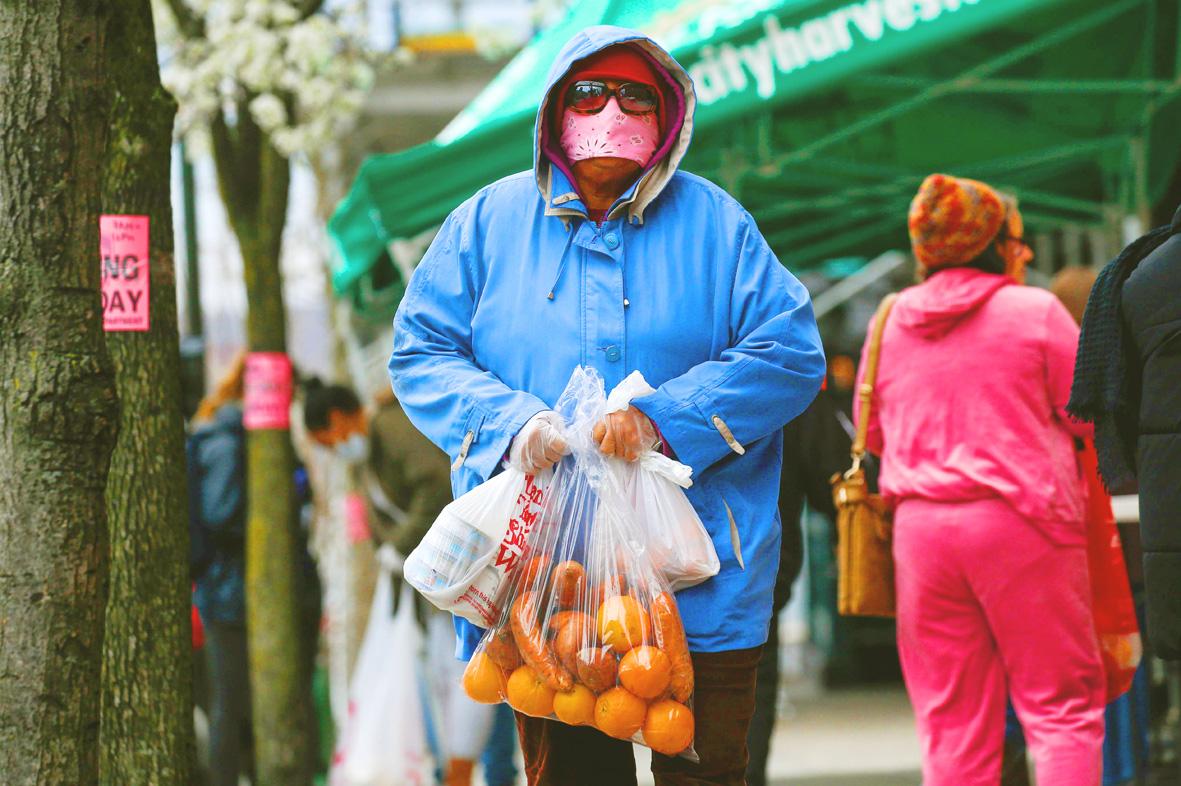New York food banks have become inundated with newcomers deprived of income since the near-total halt of business in the city.
Sacks of oranges, sweet potatoes and onions are spread over three tables at an open-air market in Washington Heights, a neighborhood in the north of Manhattan. Sterilized milk and cans of tuna and salmon cover three others. Hundreds of people came over the weekend to restock at the distribution center, one of many run by City Harvest, a major New York-based charity.
There are no long lines reminiscent of the soup kitchens of the 1930s. Instead, people trickle in, often wearing masks for protection and keeping their distance from each other under the direction of market volunteers.

Photo: AFP
Among the customers is Lina Alba, 40, a single mother with five children aged 11 to 23. She worked as a maid in a Manhattan hotel until it closed two weeks ago.
Her two oldest children also lost their jobs.
“It is my first time,” she said. “We need the help now. This is crazy. So we don’t know what’s gonna happen in a few weeks.”
She’s trying to stay positive, though.
“At least I’m spending time with my kids... I am the teacher, I am the mom — I am everything,” she said. “We are alive, we are healthy, we just need to pray.”
It took the single mother a week to register for unemployment as the service flooded. The benefits should start arriving in three weeks.
Alba also hopes to receive at least US$1,200 from the federal government, thanks to a historic aid package passed last week by the US Congress.
“It’s not gonna be enough,” but “you’re gonna appreciate anything right now,” she said, adding that “a lot of people” need help.
Jose Neri, 51, is one of many Hispanic employees who worked in now-closed New York restaurants. He also came to a food bank for the first time. There are five people in his family.
“We’re using our savings to survive,” he said in Spanish, wearing a mask and gloves. “We’ve got what we need to hold it together for now.”
City Harvest employee Geraldine Fermin has heard stories like this a lot since most New York City business closed down two weeks ago.
“It’s heartbreaking that it has to be like that for a lot of people,” Fermin said. “People that were poor are now poorer, and people that had decent jobs, that could get by, now are poor too.”
“Before, there were 1.2 million people in New York who needed help for food. Now, there are three times as many, that’s more than 3 million New Yorkers,” City Harvest vice president Eric Ripert said.
Speaking in French, Ripert said that City Harvest, which also supplies food to about 400 homeless shelters, does not currently have any supply problems.
However, it needs funds to buy more food and is teaming up with other organizations to create a united front against “a situation that will get worse.”
“We got through Sept. 11, the great recession of 2008-2009, we got through a lot of things, but none of that is comparable to this catastrophe we’re living through,” he said.

A fire caused by a burst gas pipe yesterday spread to several homes and sent a fireball soaring into the sky outside Malaysia’s largest city, injuring more than 100 people. The towering inferno near a gas station in Putra Heights outside Kuala Lumpur was visible for kilometers and lasted for several hours. It happened during a public holiday as Muslims, who are the majority in Malaysia, celebrate the second day of Eid al-Fitr. National oil company Petronas said the fire started at one of its gas pipelines at 8:10am and the affected pipeline was later isolated. Disaster management officials said shutting the

DITCH TACTICS: Kenyan officers were on their way to rescue Haitian police stuck in a ditch suspected to have been deliberately dug by Haitian gang members A Kenyan policeman deployed in Haiti has gone missing after violent gangs attacked a group of officers on a rescue mission, a UN-backed multinational security mission said in a statement yesterday. The Kenyan officers on Tuesday were on their way to rescue Haitian police stuck in a ditch “suspected to have been deliberately dug by gangs,” the statement said, adding that “specialized teams have been deployed” to search for the missing officer. Local media outlets in Haiti reported that the officer had been killed and videos of a lifeless man clothed in Kenyan uniform were shared on social media. Gang violence has left

US Vice President J.D. Vance on Friday accused Denmark of not having done enough to protect Greenland, when he visited the strategically placed and resource-rich Danish territory coveted by US President Donald Trump. Vance made his comment during a trip to the Pituffik Space Base in northwestern Greenland, a visit viewed by Copenhagen and Nuuk as a provocation. “Our message to Denmark is very simple: You have not done a good job by the people of Greenland,” Vance told a news conference. “You have under-invested in the people of Greenland, and you have under-invested in the security architecture of this

Japan unveiled a plan on Thursday to evacuate around 120,000 residents and tourists from its southern islets near Taiwan within six days in the event of an “emergency”. The plan was put together as “the security situation surrounding our nation grows severe” and with an “emergency” in mind, the government’s crisis management office said. Exactly what that emergency might be was left unspecified in the plan but it envisages the evacuation of around 120,000 people in five Japanese islets close to Taiwan. China claims Taiwan as part of its territory and has stepped up military pressure in recent years, including